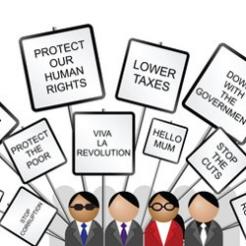Concerns have been raised that new guidance from the Electoral Commission on the Lobbying Act is not in line with assurances that the normal campaigning activities of charities will not be restricted by the controversial legislation.
The Electoral Commission published guidance yesterday aimed at helping charities comply with the Transparency of Lobbying, Non-Party Campaigning and Trade Union Administration Act 2014 when the new rules come into force on 19 September.
But Simon Steeden, a non-executive director of Friends of the Earth and partner at charity law firm Bates Wells Braithwaite, said he had a number of concerns after going through the guidance.
Charities and voluntary organisations were already concerned about how widely the “purpose test”, which sets out what campaigning activity would fall under the Act, would be cast.
It is aimed at activity that can reasonably be regarded as intended to influence voters to vote for or against one or more political parties, candidates or category of candidates.
“In Parliament many of the statements from ministers were to the effect that the law was not intended to restrict the normal policy campaigning activities of charities, but checking the guidance we think it is difficult to say that it won’t restrict the normal campaigning activities of charities,” Steeden said.
Charities want to know whether or not they have to register with the Electoral Commission, but it is not clear, he said, as it depends on issues outside charities’ control; the policies of political parties.
Steeden said constituency limits were also an area of concern and when a particular issue, such as wind farms or HS2, which are of both national and local significance, falls under the lower local limits.
“There are general concerns about the chilling effects and what an administrative headache it is going to cause,” he said.
Campaigning activity is also only regulated if it is aimed at members of the public and charities’ communications with members and committed supporters is exempted.
But Steeden said uncertainty remained regarding the definition of members and committed supporters.
He also raised concerns that the guidance has not been published to give charities enough time to consider the implications of the Act on their campaigning activities before it comes into force in September.
“There is likely to be a lot of uncertainty for charities to deal with in a small amount of time,” he added.
A spokesman for the Electoral Commission said: “The test for being covered by this legislation is exactly as it was before – is a charity planning on running a campaign intended to influence voters to vote for a particular party or candidates, and is it aimed at the public. If the answer is yes to each of these questions, then depending on how much that charity is intending to spend on their campaign – they may need to register with the Electoral Commission.
“It’s important that charities and other non-party campaigners take a bit of time to read our guidance. The publication of our guidance is just the first step in ensuring that charities and other non-party campaigners are aware of, and understand the new rules.
“We’ll be running webinars over the summer where people can ask us questions and we will continue to speak at events over the coming months. Also, we’ll continue to send our campaigner updates and this will allow us to respond to any specific concerns charities or others have.”









